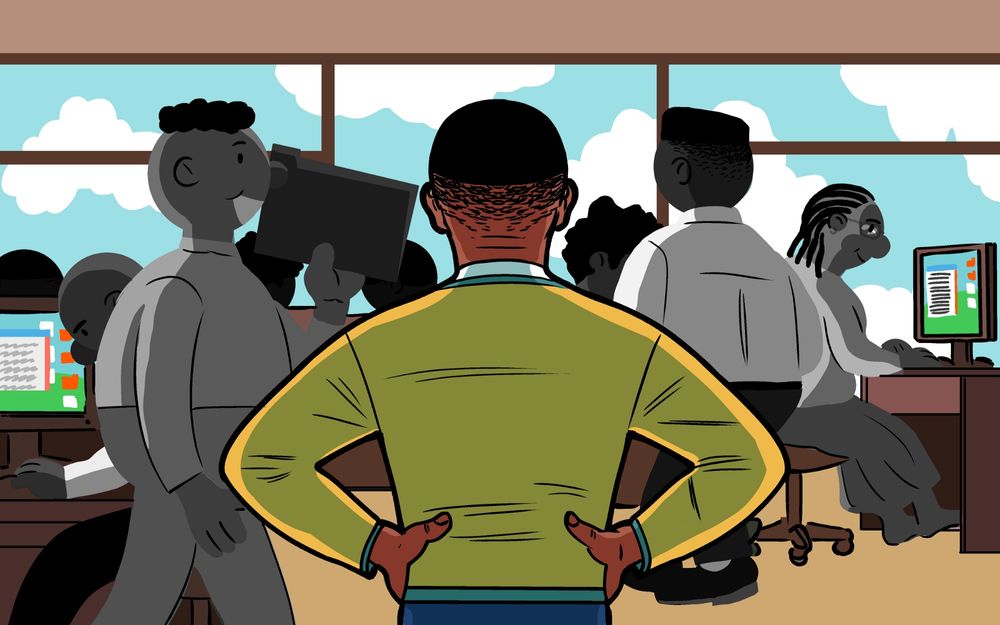Last week, I had lunch with Adam, a friend and former colleague visiting from Portland. Outdoor seating, of course. He, like me, is part of the token Black employee gang at another company, so whenever we link up, we get into a competition of oppression Olympics: who faces the most annoying microaggressions, how our respective companies are botching diversity efforts, how much onus is put on each of us to bring about change at said gigs. You know — fun, light discussion.
Banter aside, though, we always make sure to toast to thriving (not just surviving!) in a Mad Men world. Neither of us envisioned making it to a point in our careers where we could take 90-minute lunch breaks and play a game of Whose Corporate Credit Card Will Cover the Bill? It’s not that we ever lacked confidence in ourselves, but more that we didn’t know what the wider world held. We’d find out soon enough, though.
Adam and I met fresh out of college, as new hires at a Black-run media company. While it wasn’t Black-owned, you’d never know it by looking at the workforce; executive leadership, senior-level staff, middle management, and entry-level roles were all predominantly composed of BIPOC employees, who were serving an identical clientele. I was happy to be there, but as time went on, Adam and I worried about whether the gig was a true résumé builder. Sure, the company gave us clout at local barbershops, but would the work we were doing be taken seriously by the mainstream companies where we aspired to work? We had no idea.
While Adam and I have reached higher altitudes on the corporate ladder, our quest for more power now comes in a structure that was never designed with us in mind.
It was the kind of self-doubt fueled by years of brainwashing — the pervasive belief that somehow Black companies that focused on Black people were nice to talk about at happy hour, but wouldn’t be taken seriously by recruiters at Fortune 500 companies unless those recruiters were also Black. Looking back, it’s easy to see how naive and toxic that thinking was, especially now that companies need to be more woke but don’t have the range to do so, leaving people of color to do work that’s well outside of our job description.
At that first post-college job, diversity, equity, and inclusion was only about rotating office DJ privileges or the restaurants we’d order from for group lunch. Conversations about culture would often become spirited debates. And there was no need for code-switching — we all spoke the same language. Our office selves were a little closer to the versions that clocked out at 5 p.m. on a Friday.
That’s not to say professional life was utopian back then. There were difficult personalities. People who’d power trip. Cases of favoritism. Plus, resources tended to be more limited than they were at the gigs that have since decorated my LinkedIn page. (Funny how that works.) There were all the same problems that most people complain about in a white-collar job — except for the specter of racism.
Now we have things like peer reviews and 360 feedback and organizational charts that clearly show who has power and who doesn’t. While Adam and I have reached higher altitudes on the corporate ladder, our quest for more power now comes in a structure that was never designed with us in mind. We have to build the plane while flying it away from the toxicity of White supremacy.
So sure, I miss the days where I didn’t have to worry about coming off as angry simply due to the color of my skin. Or when my colleagues wouldn’t bungle their many opportunities to be allies. Yet if I knew then what I know now, I still would’ve strived for more. After all, working in a bigger role for a more esteemed brand has its perks. Growth, even when it’s uncomfortable, is good for all of us. But Adam and I both agreed, in those beginning years of our careers, when the sky was the limit, being on the ground floor at a Black-run company had a nice view, too.
Read more: Behind the Headlines of Corporate America’s Latest Blunders
